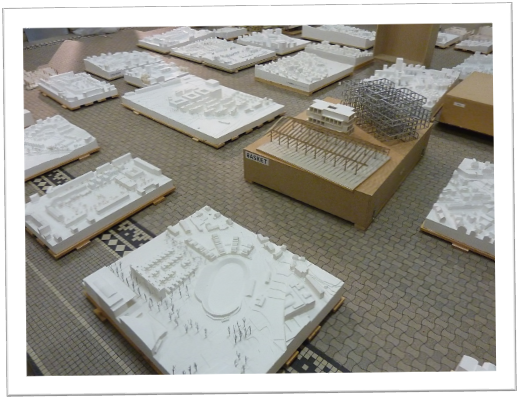Call for Membership: Small towns and metropolitan cores: towards cooperation? A European perspective
To establish an international working group on
‘Small towns and metropolitan cores: towards cooperation? A European perspective’
the ARL is currently looking for participants.
The members of the working group will work for approximately three years together and address the topic and its sub-aspects both from inter- and transdisciplinary perspectives.

Background
In the current globalization era, large cities and metropolitan city-regions are seen as major places of a society based on knowledge, innovation and creativity. Nevertheless, while 30% of the EU population lives in cities of more than 100,000 inhabitants, 38% lives in urban settlements of populations between 5,000 and 100,000 (European Commission, 2011). For several reasons, academics and practitioners at the national and EU scale debate much less the situation of and the challenges faced by smaller urban settlements. The limits of size and functions of ‘small towns’ are not unanimous within the research community and the national contexts in Europe are quite different. Small towns are heterogeneous regarding their spatial position: they may be included in urban regions, isolated in rural areas or part of a network of towns of a similar size (ÖIR, 2006). Across Europe, few studies have been devoted to small towns being part of a larger metropolitan area (Adam, 2006). Even less analysis has been carried out on how territorial cooperation can bring reciprocal benefits or challenges between metropolitan core and intermediate urban poles (Dembski et al., 2017). Another debate is about the contribution of such towns to overall economic growth.
Aims
The working group will analyse how European small towns, in all their diversity, face metropolitan development and its associated challenges. Aiming at developing a transnational and interdisciplinary approach to the chosen topic, the working group will build on the scientific traditions of studying small towns in various European countries and will explore several main research questions:
- Regarding the spatial position of small towns: How does the urban hierarchy affect the development of small towns?
- Regarding the socio-economic development of small towns: Does metropolitan efficiency, in reality, benefit the non-metropolitan regions or, can small towns demonstrate that technological innovation can develop outside of a metropolitan milieu?
- Regarding the policy arrangements in/for small towns: Does the ‘human scale’ of small towns and the relatively lower level of complexity compared to metropolitan areas make it easier for communities to have a comprehensive understanding of the local situation and to respond in a creative way?
Organisation and procedure
The call addresses academics and practitioners from European countries, who have solid expertise on governance and planning issues of metropolises and towns. Incumbents are interested to debate and to contribute (in a comparative perspective) on/to the aforementioned challenges affecting metropolises and towns now and in the future.
We invite you to participate in the International Working Group, initiated by ARL, chaired by Prof. Christophe Demazière (Univ. de Tours/France). The working period will last for approx. three years. The group will meet for two to three workshops a year. Meetings will take place at various locations across Europe, mainly where group members are located. The group will consist of up to twelve permanent expert members, complemented by invited experts relevant to the topics of research. During the run-time the group can invite additional officials and practitioners of relevant institutions originating especially from the meeting locations. In order to promote exchange and communication across Europe the participation of group members in open meetings with scholars or in sessions at international conferences (AESOP, EURA…) is possible. The ARL will reimburse travel expenses to all working group members and invited experts according to the German Federal Travel Expenses Act (BRKG).
The research and work programme will be set out in detail at the constituent meeting. The members should contribute actively to this programme, establishing a fruitful and output-oriented dialogue. We expect the following results: English-language, peer-reviewed scientific publication – book or special issue of a peer-reviewed journal. We will realize its dissemination with a final conference to which we invite external experts, and representatives from national and EU administrations to give their feedback. This will ensure that the results are suited to enhance the European debate on the future of small towns.
The constituent meeting will take place on 23-24 of October 2020* in Berlin. As soon as we have set up the group, every member will receive more details concerning agenda, venue and accommodation.
Application
The group’s work programme requires an inter- and transdisciplinary approach, inviting the involvement of members of research institutions in urban and regional planning, geography, environmental studies, political sciences, regional economy, and other relevant disciplines.
If you are interested in participating in the working group, please submit your statement of interest (in digital form) by
10.07.2020.
In your application, you should 1) briefly explain your interest in participating (max. 300 words), 2) specify your research perspectives and potential contributions to the working group (max. 500 words) and refer to your relevant professional skills and experience (short CV, including the bibliography of your most relevant publications/projects; max. two pages). Please send your application in digital form to Evelyn Gustedt as the responsible expert at the Academy for Spatial Research and Planning (ARL).
Dr.-Ing. Evelyn Gustedt
ARL - Academy for Territorial Development in the Leibniz Association
ead of Department “European and International Spatial Development”
Vahrenwalderstr. 247
30179 Hannover (Germany)
Tel.: +49-511 34842-29
gustedt@arl-net.de
www.arl-net.de
*Changes of schedule might apply due to Covid-19 related travel restrictions and virtual meetings might be organized in the early stage of this working group. The academy prefers personal meetings whenever possible.



